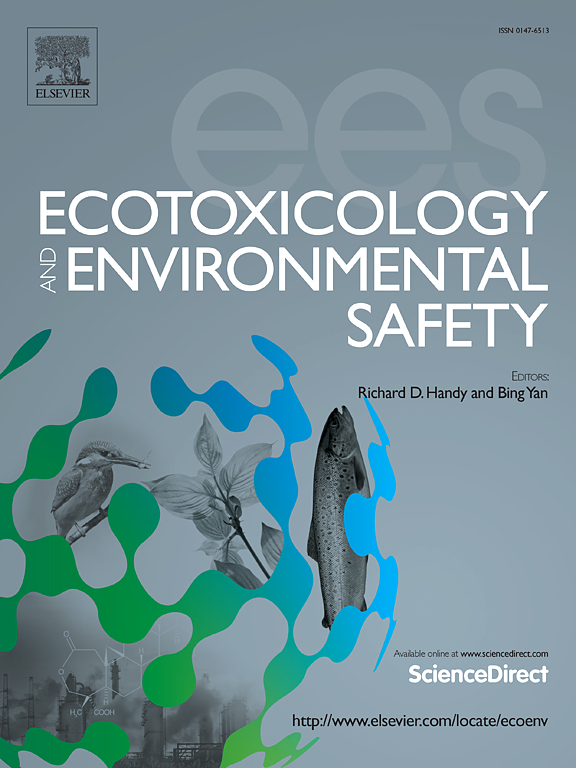Antioxidant and renal protective effects of Nano-selenium on adenine-induced acute renal failure in canines
IF 6.2
2区 环境科学与生态学
Q1 ENVIRONMENTAL SCIENCES
引用次数: 0
Abstract
Acute renal failure is a common clinical disease in canines, affecting antioxidant levels and decreasing the body's resistance. This study aims to explore the therapeutic mechanism of Nano-selenium in acute renal failure. The histopathological and imaging changes of kidney tissue were observed with the gene and protein expression levels of Keap1, Nrf2, HO-1, and NQO1 in the kidney. According to our findings, adding nano-selenium can effectively reduce the concentration of CRE and BUN in blood and kidney tissues. It increased the activity of GSH-PX and SOD by an effective reduction of MDA. Through pathological and imaging observations, it was found that adding nano-selenium could improve the kidney tissue structure of acute renal failure. The results of the RT-qPCR experiment showed that after the addition of nano-selenium, the mRNA expression of the Keap1 gene decreased significantly. In contrast, the mRNA expression of the Nrf2, HO-1, and NQO1 genes increased significantly. The experimental results were further verified by western blot and immunohistochemical analysis. Hence, the nano-selenium intervention improved kidney function and increased antioxidant levels in canines suffering from acute renal failure with the involvement of the Keap1-Nrf2/ARE signaling pathway.
纳米硒对腺嘌呤诱导的犬急性肾衰竭的抗氧化和肾保护作用
急性肾衰竭是犬类常见的临床疾病,会影响抗氧化剂水平,降低机体抵抗力。本研究旨在探讨纳米硒对急性肾衰竭的治疗机制。我们观察了肾组织的组织病理学和影像学变化,以及肾脏中Keap1、Nrf2、HO-1和NQO1的基因和蛋白表达水平。根据我们的研究结果,添加纳米硒能有效降低血液和肾组织中 CRE 和 BUN 的浓度。通过有效降低 MDA,提高了 GSH-PX 和 SOD 的活性。通过病理和影像学观察发现,添加纳米硒可改善急性肾衰竭患者的肾组织结构。RT-qPCR 实验结果显示,添加纳米硒后,Keap1 基因的 mRNA 表达量明显下降。相反,Nrf2、HO-1 和 NQO1 基因的 mRNA 表达则明显增加。实验结果通过 Western 印迹和免疫组化分析得到了进一步验证。因此,在 Keap1-Nrf2/ARE 信号通路的参与下,纳米硒干预可改善急性肾衰竭犬的肾功能并提高其抗氧化水平。
本文章由计算机程序翻译,如有差异,请以英文原文为准。
求助全文
约1分钟内获得全文
求助全文
来源期刊
CiteScore
12.10
自引率
5.90%
发文量
1234
审稿时长
88 days
期刊介绍:
Ecotoxicology and Environmental Safety is a multi-disciplinary journal that focuses on understanding the exposure and effects of environmental contamination on organisms including human health. The scope of the journal covers three main themes. The topics within these themes, indicated below, include (but are not limited to) the following: Ecotoxicology、Environmental Chemistry、Environmental Safety etc.

 求助内容:
求助内容: 应助结果提醒方式:
应助结果提醒方式:


